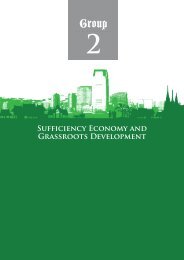Conflict, Legitimacy and Government Reform: Equitable Allocation of ...
Conflict, Legitimacy and Government Reform: Equitable Allocation of ...
Conflict, Legitimacy and Government Reform: Equitable Allocation of ...
You also want an ePaper? Increase the reach of your titles
YUMPU automatically turns print PDFs into web optimized ePapers that Google loves.
118 KPI Congress XI<br />
by all groups <strong>and</strong> that a mechanism to monitor <strong>and</strong> enforce the rules in<br />
accordance with the purpose <strong>of</strong> the law be agreed upon.<br />
For Thai society, the fundamental rule agreed upon by all sectors in<br />
the political, economic <strong>and</strong> social system is liberal <strong>and</strong> democratic.<br />
Nonetheless, there are some disagreements over subsidiary issues, such as<br />
political party-control, the representative election system, <strong>and</strong> the<br />
authority <strong>and</strong> duties <strong>of</strong> independent organization, in particular the<br />
Election Commission.<br />
The development <strong>of</strong> the political system in the past focused on<br />
building up the strength <strong>of</strong> political parties. Thail<strong>and</strong>’s 1974 constitution<br />
<strong>and</strong> the following ones state that MP c<strong>and</strong>idates <strong>and</strong> MPs must be<br />
members <strong>of</strong> parties (they cannot run as independents) <strong>and</strong> that the<br />
House <strong>of</strong> Representatives has the authority to establish <strong>and</strong> impeach the<br />
government.<br />
However, Thail<strong>and</strong>’s experience shows that the aim <strong>of</strong> using political<br />
parties as the main mechanism in developing democracy <strong>and</strong> improving<br />
government efficiency has failed. Thai politics is still unstable <strong>and</strong><br />
inefficient, with groups that are not in power acting disloyally. There are<br />
also occasional political disturbances <strong>and</strong> violence, for example, the<br />
“Right kills Left” incident on 6th October 1976, the “Young Turk”<br />
coup attempt on 1st April 1981 <strong>and</strong> the “Black May” event <strong>of</strong> 1992.<br />
The popular democratic movement forced the post-“Black May”<br />
1992 government to reform the whole political system. The coalition<br />
government led by Chart Thai Party that came to power in 1995<br />
launched a political reform campaign that led to the abrogation <strong>of</strong> the<br />
1991 constitution <strong>and</strong> the adoption <strong>of</strong> a new constitution in 1997.<br />
Thail<strong>and</strong>’s 1997 constitution aimed to build up the strength <strong>of</strong><br />
political parties in the democratic system <strong>and</strong> make the political system<br />
transparent, so that it would become an institution that is accountable<br />
<strong>and</strong> trustworthy to every Thai. The 1997 constitution used various<br />
measures to achieve its goal. Political parties were strengthened by<br />
creating a system that favored large political parties, putting small<br />
political parties at a disadvantage <strong>and</strong> preventing MPs from switching














